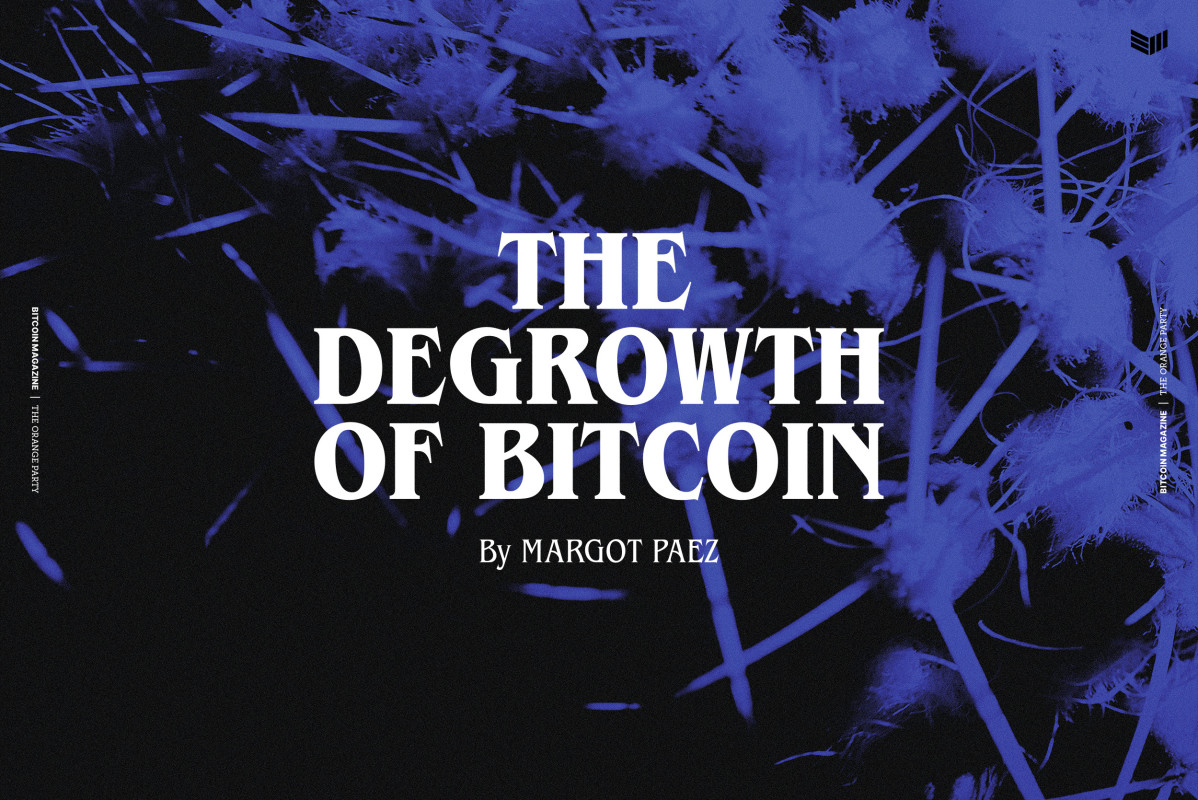Blogs & Articles: The Degrowth of Bitcoin 🔗 6 weeks ago

- Category: Blogs & Articles | Bitcoin Magazine: Bitcoin News, Articles, Charts, and Guides
- Author(s): Margot Paez
- Published: 8th August 2024 13:58
Austrian economics dominates the discourse on bitcoin, but it is not the only heterodox economic theory that describes the importance of a type of money that sounds strikingly like bitcoin. Aspects of degrowth and ecological economics promote an end to fiat and inflationary currencies. While we often focus on the benefits of bitcoin mining for the current energy transition away from fossil fuels, bitcoin has an even more important role to play in transitioning our societies to a sustainable and more equitable world.
Bitcoin’s energy consumption is both trivial and not trivial at the same time. The network consumes less than half a percent of the world’s electricity consumption. Some have called this nothing more than a “rounding error”. At the same time, it is hard to deny that this sliver of energy use is on the order of magnitude of the energy use of a small country. Of course, many global technologies are more energy intensive than Bitcoin; data centers, air conditioners, and the banking industry all come to mind.
There are valid reasons to worry about energy consumption and more than that, the potential for growing energy consumption. There’s enough peer-reviewed literature available on the internet that shows a definitive link between energy consumption and environmental degradation. From an ecological economics and degrowth perspective, this is generally a result of the neoclassical drive for never-ending economic growth.
The results of environmental degradation due to never-ending economic growth are obvious. Many scientists believe we’re in the midst of a sixth mass extinction that humans are primarily responsible for. A recent German study found a nearly 80% decline in insect biomass over the last 20 years. The Brazilian tropical forests, once one of our best carbon emission sinks, are now turning into carbon emission sources due to increased global temperatures and agribusiness-driven deforestation. Chemical pollution is everywhere. Microplastics were recently found in human blood samples and Monsanto’s Roundup can now be found in urine samples. All evidence that the bad incentive design of our existing economic system is pushing the planet far away from comfortable habitability, not just for humans but for all species.
The hard reality is that Bitcoin’s energy consumption will continue to grow for some time, assuming more and more people adopt bitcoin. If you’re worried about climate change and know the basic relationship between energy consumption, economic growth, and environmental degradation, then Bitcoin’s energy use does sound scary. The most important detail to understand about Bitcoin is that the network’s energy use is constrained and also essential for providing the kind of monetary system that will sustain a degrowth global economy.
Degrowth is a social, political, and economic movement. It’s a broad movement of people who advocate that the wealthiest countries reduce their overall energy consumption while allowing room for developing countries to raise theirs. There’s a growing call from the climate movement for the world to move away from economic growth and toward degrowth. Ecological economics provides a concrete foundation for how this would work through a convergence of degrowth-growth into an overall steady-state economy.
The steady-state economy is where our economy comes into line with what our planet is capable of sustaining. Contrary to what some may think, there are no species on this planet that can outgrow their habitat and survive for very long thereafter. Ecological economist Brian Czech calls a steady-state economy “economics for a full-world”; one where the economy has grown so big that it is pushing the environment to its limits.
Degrowth is more than steady-state economics and energy use, though. It also promotes an end to fiat, inflationary, and debt-based currencies. Degrowth encourages localism and frugal living that is in line with nature. One could argue that degrowth is exactly what Bitcoiner low-time preference looks like when applied across all aspects of the economy. Degrowth means eliminating wasteful consumerism, bullshit jobs, and rent-seeking. It also promotes indigenous methods of natural management and permaculture.
Indeed, if we want degrowth, then we have to build new infrastructure to sustain this low-time preference way of living. If we are going to eliminate fiat, inflation, and debt-based currencies, then we will need to build a robust, decentralized, and secure monetary network that we can use to keep our degrowth economic system in planetary check.
In Supply Shock: Economic Growth at the Crossroads, Czech explains that inflation happens “when a monetary authority (such as the Federal Reserve in the United States) increases the money supply faster than the real economy can grow”. Czech is not an Austrian economist but a full-on degrowther. He continues, “recent periods of rapid, real economic growth… have tended to result in inflation, because the monetary authorities are too removed from the realities of economic life to understand ecological limits to growth”.
From the ecological economics perspective, the origin of money is fundamentally a result of agricultural surplus; not debt, not the state. Although these certainly play a second-order role in the development and adoption of money, without agricultural surplus, there would be no division of labor, and without division of labor, there would be no need for exchange. Taken to the extreme, if our food systems completely collapsed this year, everything else would go with it and each of us would be back to spending most of our time finding enough food to survive; we would not need money.
From the first and second laws of thermodynamics, we know that energy is neither created nor destroyed and that when energy is converted the process is imperfect, and some of it dissipates. This means that these physical laws place an ecological limit on our planet that ultimately sets an upper bound on agricultural surplus. From an ecological economics standpoint, this means that money has a limit.
Bitcoin is money and it has a limit, too. In 2140, the last of 21 million bitcoin will be minted. In the early 2030s, 98% of all bitcoin will have been created. Bitcoin’s energy consumption grows so long as the value of bitcoin sustains its growth. At some point, if bitcoin becomes the world’s money standard, all the world’s value will be on the monetary network. When that happens, the growth of the network’s hash rate and thus energy consumption will have to slow down and likely reach a steady state of its own. This will happen because of diminishing returns as the network mining difficulty increases and competition is tight.
If ecological economic theory is right, then the total value of the Bitcoin network should reflect the full planetary limit to available resources that provide an agricultural surplus. Since we cannot create more energy, it must therefore be true that we cannot create more bitcoin. Our socio-economic system will have to buy into this idea of limits and that’s where the broader societal prescriptions from degrowth will be useful. In addition, there’s a saying in the bitcoin community; “you don’t change bitcoin, bitcoin changes you.” It’s possible that adopting bitcoin will turn people away from instant gratification consumerism, something bitcoiners colloquially refer to as high-time preference.
Because mining happens globally, we expect that energy consumption will grow during the period of economic convergence. If degrowthers, ecological economists, environmentalists, and climate activists get on board now, then they can help shape the future of where and how that energy consumption develops to make sure that it’s well distributed in regions of the world that are currently suffering from energy poverty. This will ensure that developing countries get the most benefit from the network’s growth and thus facilitate one part of the degrowth-growth steady-state convergence.
We are starting to see this play out. Bitcoin adoption is generally highest in less-developed countries where people are subject to hyperinflation, and unstable and repressive monetary regimes. Alongside that, governments in some developing countries like the Central African Republic are studying how to use bitcoin mining to develop their natural renewable energy resources. The newly elected president of Colombia, Gustavo Petro, a progressive-leaning politician, has also shown interest in using bitcoin mining for the same purpose.
Bitcoin is often criticized for rewarding early adopters over later adopters, and critics often claim that this will create a new class of crypto-oligarchs to rule the world. In a recent Bitcoin Policy Institute article called, “Is Bitcoin Fairly Distributed?”, the authors pointed to a recent CoinMetrics study that showed that despite “large institutions entering the space, bitcoin is still very much a grassroots movement,” and has the best distribution of currency when compared to alternative cryptocurrencies.
Money alone cannot solve the unequal distribution of resources, but if we couple money like bitcoin with a set of economic rules that reduce economic inequality (the book Radical Markets provides some reasonable market mechanism designs), then over time, the wealth will be fairly distributed among all people. Maintaining a society that is sustainable under a steady-state economy requires that we reduce all forms of inequality.
Believing that climate change is real is not necessary for adopting the above perspective. Limits to natural resources mean there’s a natural limit on oil. The United States reached peak oil production in the 1970s and the recent U.S. shale boom won’t last forever. As we’ve seen, energy independence is necessary for fortifying supply chains and promoting localism in our socio-economy. If we want a similar quality of life for future generations, then adopting bitcoin and perspectives from ecological economics and degrowth are essential for extending the best aspects of our current society out into the far future. Despite what critics say, bitcoin has a very important role to play here. While this is an incredible burden, it’s on us to get this message out to the rest of the world. The clock is ticking.
margotpaez_degrowth








